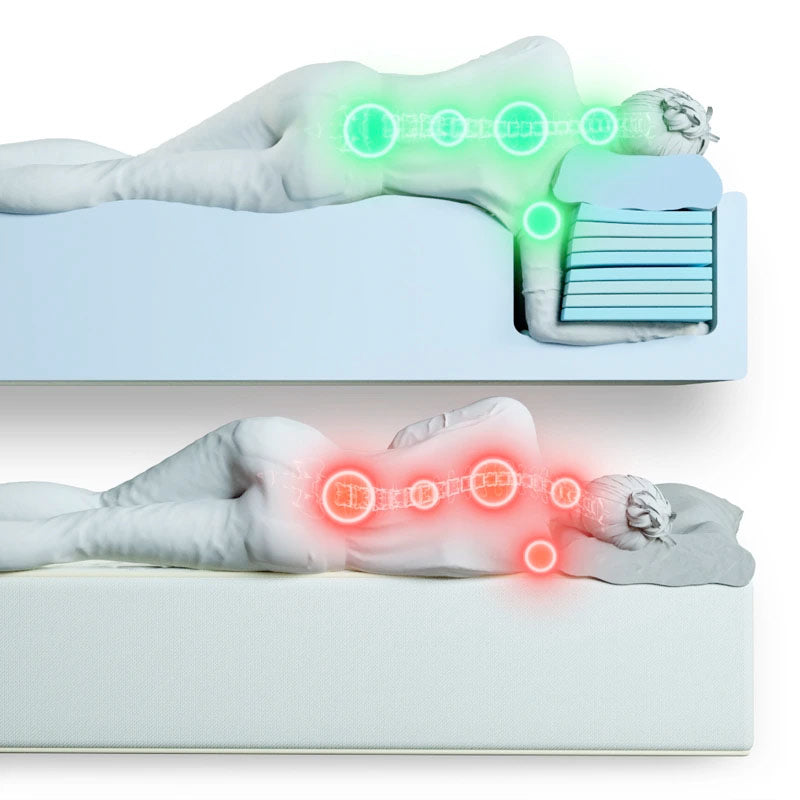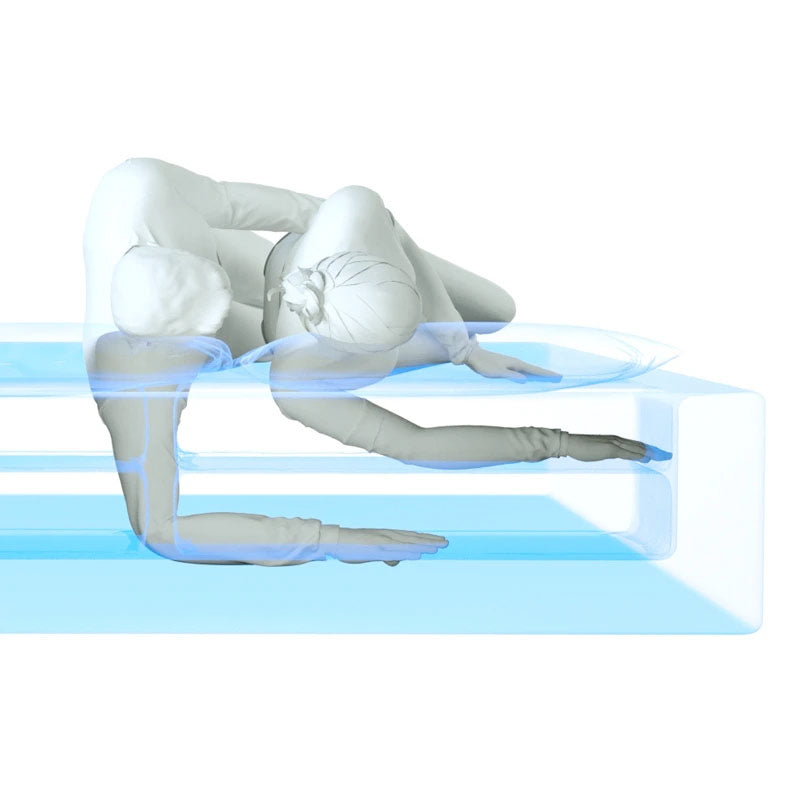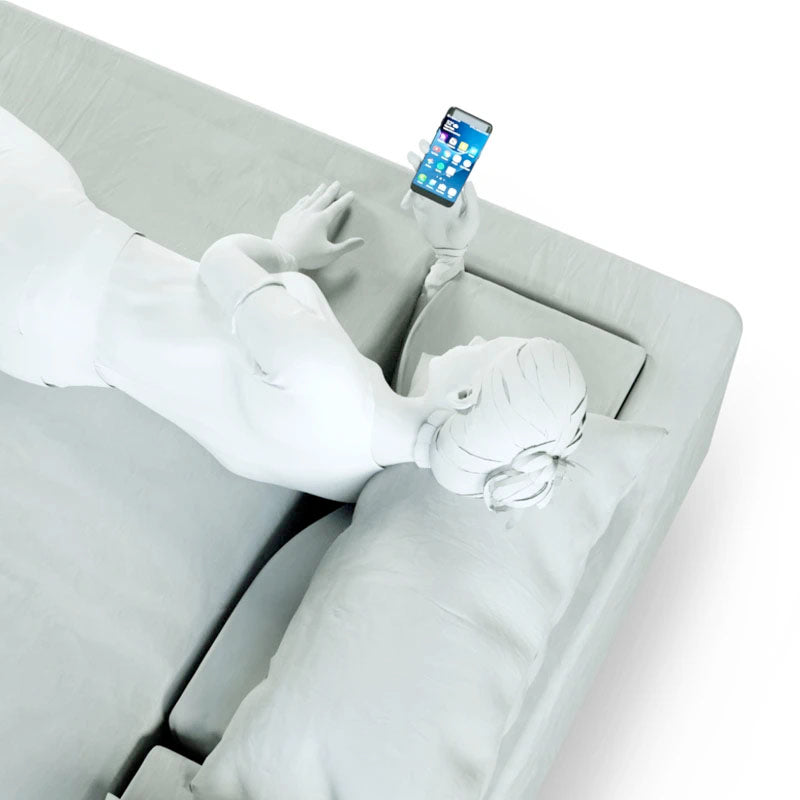Do you or someone you know suffer from fibromyalgia? What even is fibromyalgia?
Up to 4.8% of the global population suffers from fibromyalgia. The disorder is most common in women, and there is currently no cure.
Fibromyalgia is a musculoskeletal pain disorder. It can affect the way the brain and spine receive and transmit pain signals.
What causes fibromyalgia? It usually occurs when there is overstimulation of the nerves between the brain and the spinal cord. Fibromyalgia can also develop due to genetic mutations, illnesses or infections, and traumatic events like accidents.
Who is at risk for fibromyalgia? Women, people with a genetic history of the disease, those who have lupus, and people with arthritis are the most susceptible to the disorder.
SONU is steadfastly working to help pain sufferers get excellent sleep. Check out the SONU Sleep System to learn about an unparalleled sleep experience.
What Are Common Fibromyalgia Symptoms?
People living with fibromyalgia experience a range of symptoms. These symptoms include:
- Tension headaches
- Migraines
- Depression
- Anxiety
- Irritable bowel syndrome (IBS)
- Temporomandibular joint (TMJ) disorders
- Chronic fatigue
- Painful bladder syndrome
- Postural tachycardia syndrome (POTS), a blood flow disorder
Fibromyalgia can also cause cognitive difficulties. The issue is nicknamed “fibro frog,” and it is known to make it extremely hard for the person with fibromyalgia to concentrate. It can also lead to sleep disturbances.
Restless leg syndrome (RLS) is also common in people with fibromyalgia. The symptoms between the two overlap. Treatment typically provided for RLS can help control the side effects of fibromyalgia.
How Are Fibromyalgia and Sleep-Related?
People with fibromyalgia often suffer from sleep disorders. The more pain they are in, the less quality sleep they experience. The duration of their sleep decreases, and the amount of wake time is increased. This can also lead to mood disorders in the person with fibromyalgia.
Patients with fibromyalgia experience less rapid eye movement (REM) sleep, which is essential to staying focused and processing information.
Sleep deprivation can induce fibromyalgia symptoms. Poor sleep quality can cause fibromyalgia pain to spread even more throughout the body. A lack of sleep can also interfere with a person’s pain threshold, causing them to feel more pain.
Low sleep quality can also put non-fibromyalgia sufferers at risk for widespread pain.
One way to manage pain and fibromyalgia is to be prescribed sleep medication. The patient will be able to sleep longer, but they will also experience less pain the day after they’ve taken the sleep medication.
How Can I Sleep With Fibromyalgia?
The sleep advice given to fibromyalgia patients includes much of the same information given to people to get good sleep, in general.
Regular Exercise
Exercising regularly can reduce fibromyalgia symptoms and improve sleep quality. Initially, someone who is sleep-deprived may not feel up to the task. However, incorporating even 30 minutes of exercise a day can help people with fibromyalgia start getting deep sleep for longer durations.
Sleep Schedule
Creating a sleep schedule has always been recommended, regardless of whether you have fibromyalgia or not. However, for the fibromyalgia patient, training the body to get up and go to bed at the same time each day can trigger better quality of sleep. Avoiding stimulants and naps later in the day can also help you stay on track with your schedule.
Vitamins
Fibromyalgia patients do not always get enough essential vitamins, like Vitamin D. Talking to a doctor to find out where you are deficient is the first step. They will likely recommend that you take supplements, change your diet, or even get more sunlight (a source of Vitamin D) to help you get a sufficient amount of the vitamins you are lacking.
Good Mattress
When you have fibromyalgia, the bed you sleep on is very important. Getting enough sleep is hard enough; you don’t need an uncomfortable mattress adding to your pain. Do your research. Read reviews and seek some assistance in finding a suitable bed for people with fibromyalgia.
Next, we’ll explain how a good mattress can help ease fibromyalgia pain.
5 Ways Mattresses Help With Fibromyalgia
There are at least five factors that make mattresses good for fibromyalgia. These factors are pressure relief, support, edge support, firmness, and motion isolation. When a person living with fibromyalgia is shopping for a mattress, these five factors should always be at the top of the list to help you find the best choice.
1. Pressure Relief
Sleeping on a mattress that applies too much pressure on the body can be incredibly painful if you have fibromyalgia. It’s necessary to find a mattress that provides pressure relief while helping you get a comfortable night’s sleep. Memory foam mattresses do this by contouring to your body shape.
2. Support
Proper support should help keep your spine aligned when you sleep. This is important for people with fibromyalgia because lying on a mattress with inconsistent support can misalign the spine, creating pain in the body from top to bottom. A supportive mattress should keep your body level when you sleep.
3. Edge Support
Edge support should also be considered when buying a mattress for someone with fibromyalgia. Someone in intense pain needs the perimeters of their mattress to be strong and sturdy in case they sleep close to the edge of the bed. A saggy mattress with little edge support can put you at risk of falling off the bed.
4. Firmness
Mattress firmness is related to how much pain relief you receive. If you have fibromyalgia, you should not sleep on a mattress that is too soft or too firm. A medium to medium-firm mattress is usually the right choice for many people. If it is still a little hard on your body, you can cover the mattress with a soft topper.
5. Motion Isolation
How much shock absorbency a mattress provides when someone moves is very important if you have fibromyalgia. If you have this disorder and you have a co-sleeper, you’ll want to consider how much their movement in bed may exacerbate your pain and disrupt your sleep. A good mattress will provide enough motion isolation that you can hardly feel when the other person moves.
What Are the Best Mattresses for Fibromyalgia?
Latex
Latex mattresses provide support without the sunken feeling that can come with many memory foam mattresses. The mattresses offer adequate spine support. They also offer better temperature control, sleeping cooler than their memory foam competition. Latex is resilient and bounces back to its original shape quickly.
Memory Foam
Memory foam mattresses are the most popular mattresses sold today. The foam responds to the heat and weight of your body to conform to your individual shape. As a result, these mattresses offer fantastic pressure relief and spine support. One caveat to sleeping on memory foam is that it tends to retain heat, which isn’t ideal for people who want to sleep on a cooling mattress.
Serene Foam
Serene foam is new to the mattress market. It’s made of high-performing polyurethane that sleeps cool due to the billions of air capsules included in the material. Serene foam does not skimp on support; instead, it absorbs shock and releases air pressure that provides the type of support you won’t get from any other mattress type.
Get It All With SONU
With SONU’s negative space mattress, you benefit from these materials. The mattress’s support system is made up memory foam, and other high resilience foams that are then topped off with a cooling layer of Serene foam.
Not only does the negative space mattress conform to your unique shape, but it also features a patented Comfort Channel that allows you to let your shoulders and arms sink into the mattress.
Conclusion
As you can see, having the right mattress is crucial for people living with fibromyalgia. Pressure relief, firmness, support, edge support, and motion control are five factors to consider when purchasing a mattress for someone with this autoimmune disease.
SONU Sleep has created an original mattress made out of 26 layers of memory foam, other high-quality foam topped off with a layer of Serene foam. SONU’s goal is to help customers experience less pain and discomfort when they sleep by offering them a patented Comfort Channel, adjustable pillows, and multiple firmness levels to suit the needs of every sleeper.
Add the SONU Sleep System to your pain-relief arsenal if you have fibromyalgia. If you aren’t satisfied after 100 days, you can return the mattress for a full refund.
FAQ
What causes fibromyalgia?
Fibromyalgia is often genetic. It can also be caused by trauma, an infection, or an illness.
How do fibromyalgia and sleep affect each other?
Not getting enough sleep can exacerbate a fibromyalgia patient’s pain. Likewise, the pain from fibromyalgia can make it difficult for the sufferer to get a full night’s sleep. A doctor may prescribe a sleep medication to help with both issues.
What mattress firmness level is best for fibromyalgia?
You do not want a mattress that is too soft or too hard. A medium to medium-firm mattress is usually recommended for people living with fibromyalgia.
Are memory and serene foam mattresses too hard for people with fibromyalgia?
No. As long as you select the right level of firmness, memory and serene foam mattresses provide support and pressure relief that lessen fibromyalgia discomfort.
I have fibromyalgia and want to try the SONU Sleep System. Do SONU mattresses come with a trial period?
Yes. All SONU mattresses come with a 100-day/night trial. If you are unhappy with your mattress after that trial period, you can return it for a full refund.
Sources:
Fibromyalgia - Symptoms and causes | Mayo Clinic
The association between pain and sleep in fibromyalgia | NIH
Fibromyalgia and Sleep: Sleep Disturbances & Coping | Sleep Foundation
Best Mattress for Fibromyalgia - 2022 Update | Sleep Advisor
The best mattress for fibromyalgia | Chicago Tribune
The role of sleep in pain and fibromyalgia | Nature Reviews Rheumatology






















